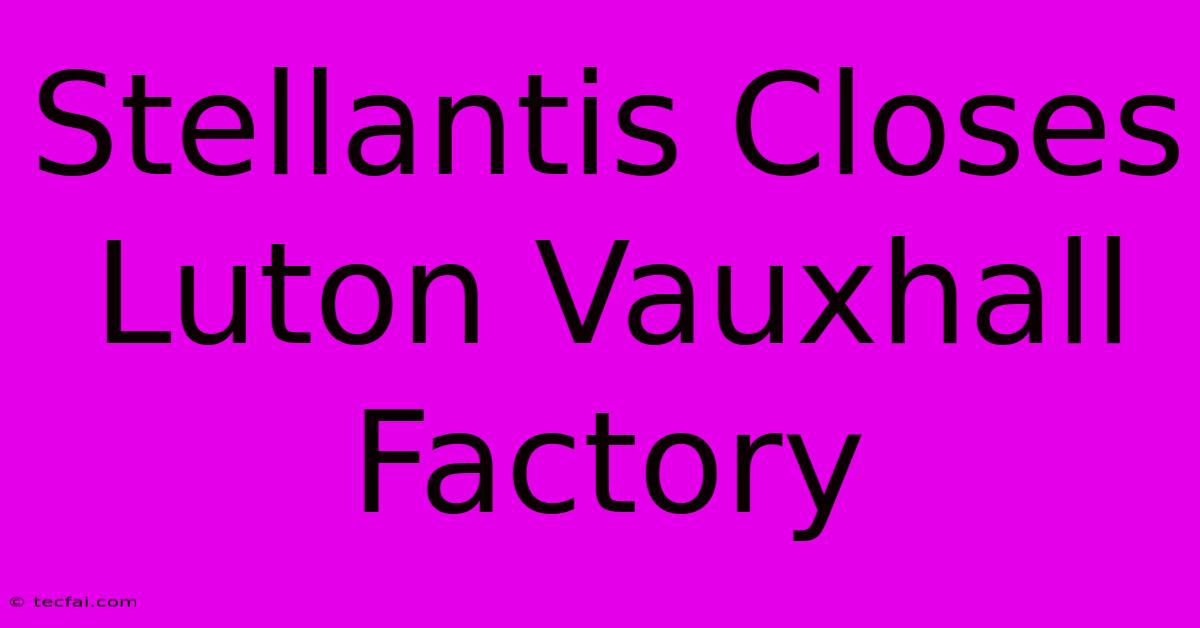Stellantis Closes Luton Vauxhall Factory

Discover more detailed and exciting information on our website. Click the link below to start your adventure: Visit Best Website tecfai.com. Don't miss out!
Table of Contents
Stellantis Closes Luton Vauxhall Factory: The End of an Era
The closure of the Vauxhall plant in Luton, England, marks a significant moment in British automotive history and a sobering example of the challenges facing the industry in the 21st century. Owned by Stellantis, the multinational automotive conglomerate formed by the merger of Fiat Chrysler Automobiles and PSA Group, the decision to cease operations at the Luton site brings an end to decades of vehicle production at the location. This article will delve into the reasons behind the closure, its impact on the local community and the wider UK economy, and what the future might hold for the site and its former employees.
The Reasons Behind the Closure: More Than Just Economics
While the official statement from Stellantis cited "economic factors" as the primary driver behind the closure, the reality is far more nuanced. The decision is a complex interplay of several issues:
-
Shifting Market Demands: The automotive landscape is rapidly evolving. The rise of electric vehicles (EVs) and the increasing demand for SUVs have significantly impacted the market for traditional vehicles like the Vauxhall Vivaro, previously manufactured in Luton. Stellantis’s investment strategy prioritizes its EV and SUV production lines, leaving less room for models produced in Luton.
-
Brexit's Lingering Impact: The UK's exit from the European Union undoubtedly added to the challenges faced by the Luton plant. Increased trade barriers and logistical complexities have added costs and reduced competitiveness within the European market. The impact of Brexit on the automotive industry is still being felt, and Luton is unfortunately a prime example.
-
Global Competition: The automotive industry is fiercely competitive, with global players vying for market share. Stellantis, like other manufacturers, needs to optimize its production network to remain profitable. This inevitably means tough decisions about the viability of individual plants.
-
Automation and Efficiency: The industry’s move towards automation and increased efficiency plays a role. While automation creates jobs in some areas, it also reduces the need for labor-intensive processes, impacting employment at plants like Luton.
The Human Cost: Job Losses and Community Impact
The closure of the Luton plant represents a devastating blow to the local community. Hundreds of jobs have been lost directly, impacting not only the workers themselves but also the wider economy of the town. The ripple effect is felt through reduced spending, increased unemployment benefits claims, and a potential decrease in local tax revenue. Support services and retraining programs will be crucial in mitigating the negative impact on the affected workers and the Luton community as a whole.
The Future of the Site and the UK Automotive Industry
The future of the Luton site remains uncertain. Stellantis has yet to announce its plans for the facility, but potential scenarios include redevelopment for other industrial purposes or repurposing for logistics and distribution. Regardless of the chosen path, the closure signals the need for a strategic reassessment of the UK's automotive industry. Investment in retraining programs, support for electric vehicle production, and a clear strategy to attract future investment are crucial to ensure the long-term health and competitiveness of the sector.
Looking Ahead: Lessons Learned and Necessary Actions
The closure of the Vauxhall plant in Luton serves as a stark reminder of the volatility of the global automotive market and the need for proactive adaptation. Governmental policies supporting workforce retraining, green technologies, and robust infrastructure are crucial for mitigating future economic shocks and ensuring a resilient and prosperous automotive industry in the UK. The lessons learned from Luton must inform future investment decisions and strategic planning to safeguard the country's industrial base. The challenge is clear: to adapt, innovate, and ensure a sustainable future for the UK automotive sector.

Thank you for visiting our website wich cover about Stellantis Closes Luton Vauxhall Factory. We hope the information provided has been useful to you. Feel free to contact us if you have any questions or need further assistance. See you next time and dont miss to bookmark.
Featured Posts
-
Vanderpump Rules Season 12 New Cast
Nov 27, 2024
-
Trump Names Bhattacharya Nih Director
Nov 27, 2024
-
Sporting Cp Arsenal Live Stream
Nov 27, 2024
-
Vanderpump Rules Reboot Two Years Later
Nov 27, 2024
-
Series Leveled Ayubs Heroics
Nov 27, 2024
